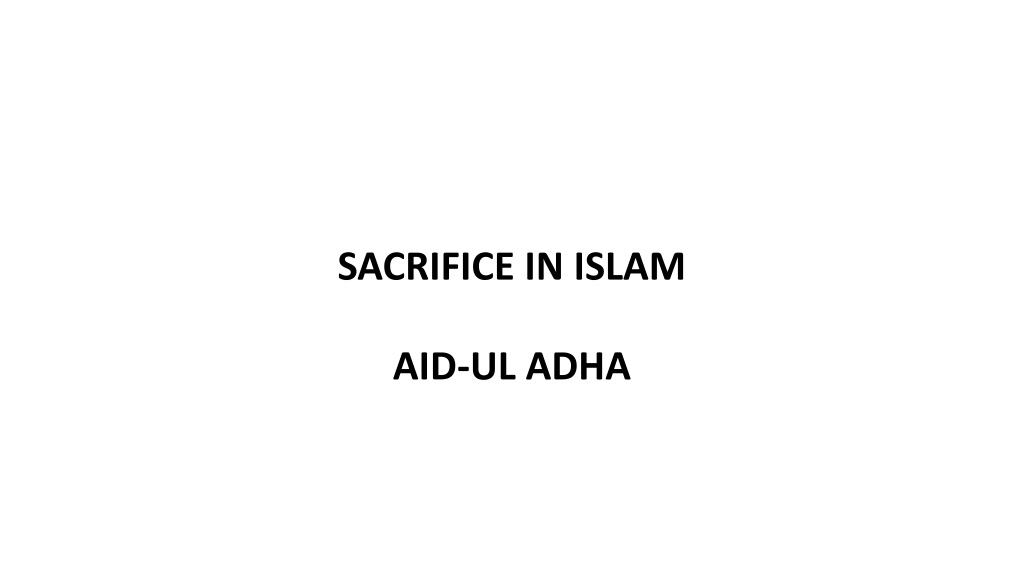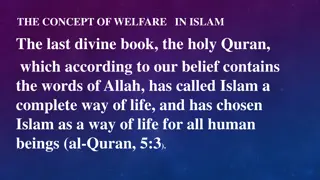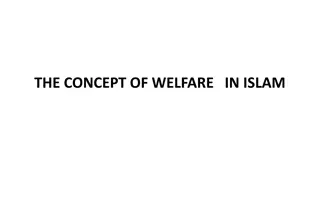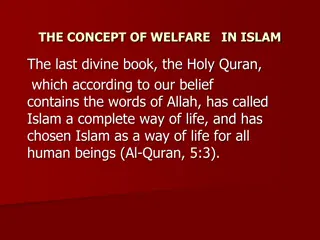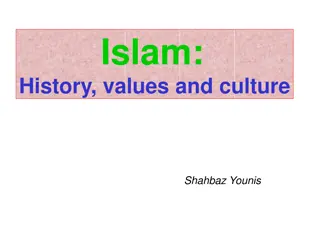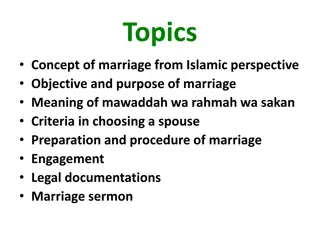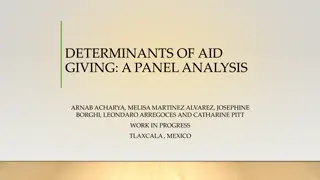Understanding Eid-ul-Adha: Significance, Obligatory Sacrifice, and Practices
Eid-ul-Adha is a significant Islamic celebration that commemorates Prophet Ibrahim's willingness to sacrifice his beloved son in obedience to Allah. Muslims perform an obligatory sacrifice of animals as an act of worship, expressing gratitude towards Allah. The time frame for sacrifice, eligibility criteria, and recommended practices during the ritual are outlined in this informative piece.
Download Presentation

Please find below an Image/Link to download the presentation.
The content on the website is provided AS IS for your information and personal use only. It may not be sold, licensed, or shared on other websites without obtaining consent from the author. Download presentation by click this link. If you encounter any issues during the download, it is possible that the publisher has removed the file from their server.
E N D
Presentation Transcript
SACRIFICE IN ISLAM AID-UL ADHA
What is Eid- Ul-Adha? Eid-ul-Adha is the celebration of sacrifice, and it is important for two reasons. -During Eid-ul-Adha we remember the spirit of Prophet Ibrahim (peace be upon him) and how he was willing to sacrifice the person (his son) he loved the most, because Allah (SWT) commanded him to. -Eid-ul-Adha ends the period of Hajj in which you can be closest to Allah. You forget about everything else in the world except focus on the moment. Even people who did not perform the Hajj that year think about what it symbolizes and celebrate it. Muslims can offer a sheep that has completed the first year of its life and begun its second year. We know this because the Prophet (peace and blessing be upon him) said, "Offer the sheep that is in its second (year) because this is what is permissible. You can also use a goat or a cow which has entered into its third year of life or a camel which has begun its sixth year of life". There are things that were determined by Ijmaa or consensus of the Scholars. When we talk about more than one person trying to put their money together to purchase an animal. There are rules that need to be followed. For example, it is acceptable for seven people to come together and participate in the offering of a male or female camel. The same is true for the offering of a cow. This is known because of the Hadeeth of Jaabir (may Allah be pleased with him) where he said, "We sacrificed with the Prophet the year of Hudaibiyah, a camel was sufficient for seven people and a cow was sufficient for 7 people as well.The sheep though is only sufficient for one person".
WHAT IS AN OBLIGATORY SACRIFICE? Sacrificing an animal for Allah (God) is an obligatory worship for Muslims who are residents, financially secure, already passed puberty according to Hanafi communion. Muslims can be counted financially secure if they have 80.18 g of gold or the equivalent value in money. Muslims should sacrifice an animal to express their gratitude towards Allah (God).
WHEN IS THE TIME OF THE SACRIFICE? At Eid al - Adha, Muslims must sacrifice an animal within the first 3 days, which start with salat al-Eid or right after fajr prayer of the first day, then ends with sunset of the third day. Animals can be slaughtered during daytimes and nights however daytimes are preferable religiously. According to Shafi i communion, animals can be sacrificed during the 4 days of Eid al - Adha, since sacrificing an animal for Allah (God) is Sunnah Mu akidah. This means that we should all be trying to perform this type of worship if possible, as it is an action that The Prophet Muhammad (peace and blessing be upon him) establish and continued to perform during Eid al-adha, which is shown in religious documents.
WHAT IS RECOMMENDED DURING THE SACRIFICE? There are 5 things recommended to be done during the sacrifice itself. They are: -Mentioning the name of Allah -Sending prayers upon the Prophet -Facing to the Qiblah -Takbeer (Allahu Akbar) -Making Dua a that it be accepted The proofs of these things are the fact that Prophet was recorded as saying "Bismillah and Allahu Akbar". There is another hadeeth where the Prophet sacrificed a sheep and when he did he said, "Bismillah, Oh Allah accept this from Muhammad, His family and His nation".
WHAT IS THE NAFL (SUPEREROGATORY) SACRIFICE? A Muslim can sacrifice an animal to be grateful to Allah and for good deeds when it is not Eid al-adha. Also there are many different reasons for the nafl sacrifice such as just getting closer to Allah (God), as a gift to our prophet Mohammed (peace and blessing be upon him), and after the death of a person who requested from relatives to sacrifice an animal in a will, etc. Muslims can slaughter animals as nafl sacrifice and distribute the meat to poor people around them as well as donate their nafl sacrifice animals to different charity locations, poor countries, and poor people in their neighborhood instead of keeping the meat for themselves.
WHAT IS THE OATH OR VOW SACRIFICE? If a Muslim devotes an animal as sacrifice for any reasons, it becomes obligatory sacrifice, which means that they have to slaughter an animal at a convenient time. If Muslims make a wish for something to happen, then they should sacrifice an animal right after that wish comes true. There is one important condition about offering sacrifice; whoever has offered the sacrifice, that person as well as his family, relatives, and wealthy people cannot eat the meat of the animal but other people can. Also if they want to eat that meat after sacrificing it, they can pay for that meat by giving the same amount of money to people in need.
WHAT IS THE AQIQAH SACRIFICE? Muslims sacrifice animals when they have newborns to thank Allah. Aqiqah is only for good deeds and not obligatory sacrifice however aqiqah animals must have the same conditions as an obligatory sacrifice animal. Aqiqah animals can be slaughtered on the first day of birth or anytime until the child hits puberty but Muslims mostly prefer the 7th day of the birth for more good deeds and protection of the child. Everyone can eat the meat of the animal but for more deeds it is better to share the meat with people in need or give to charity.
WHAT IS THE THANKFULNESS SACRIFICE? If Muslims wish for something to happen, they can slaughter an animal to express their gratitude towards Allah (God). Muslims who are pilgrims (Hadji) when it is not Hajj season, also can slaughter animal in Mecca during their holy visit to be thankful to Allah and everyone can eat the meat of the animal.
WHAT IS THE SACRIFICIAL DONATION? Traditionally, people donate the animals meat to their neighbors, relatives and the poor. Many Muslims take this time of year to make charitable donations at home and abroad. Muslims can slaughter animals themselves or they can give their deputation to someone else to slaughter the animals for them. It is also important that we remember that it is not permissible for us to sell anything from the animal, which was offered. Also some of it should be given to the poor, as we know from the Sunnah of the Prophet (PBUH). Sometimes Muslims, who have obligatory sacrifice, can donate animals or an amount of money is enough to buy an animal for charity with the promise or deputation of slaughtering animals according to religious rituals for sacrifice. In the United States and other countries the prices to buy animals, which are religiously acceptable to be sacrificed, can differ since the economy is not the same. Embrace Relief is one of the charities that accepts the sacrificial donations along with people s sacrificial deputation and slaughters the animals accordingly depending on the intent of the sacrifice. The meat of this animal is then distributed without any delay to people in need.
WHAT IS HALAL MEAT? Muslims can consume only Halal foods. Halal is the Arabic word for permissible or lawful. To make meat halal or permissible, an animal or poultry has to be slaughtered in a ritual way known as Zibah or Zabihah. Halal is somewhat like Jewish kosher and, Zibah is with some exception is similar to Shechita. These are the following rules that makes a meat Halal: - A Muslim must perform the slaughter, and will recite tasmiyah or shahada, which fulfills the requirement of dedication. - Zabihah requires animals to be alive and healthy at the time of slaughter, decaying, wounded, or sick animals are forbidden. - The knives must be sharp, so that the animal will experience the least pain possible. - All of the blood must be fully drained from the animal. Pork and carnivorous animals are forbidden Animals that are killed inhumanely, such as strangling, suffocating, or by a violent blow are also forbidden. - Since Pork is forbidden, Halal slaughtering must not be performed in the area or vicinity where pigs are slaughtered.
WHAT TYPES OF ANIMALS ARE NOT ACCEPTABLE FOR SACRIFICE? There are four types of animals that are not acceptable to be sacrificed. These are: -Blind animals or animals that have lost eyesight. -Lame animals. -Sick animals. -Animals that are near starving or very malnourished.
